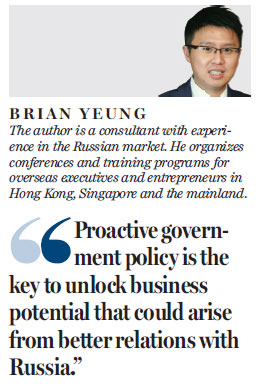HK should strengthen its ties with Russia to unlock business potential
Updated: 2016-07-19 07:21
By Brian Yeung(HK Edition)
|
|||||||||
Russia, which appears a mysterious country to many, was described as "an emerging global power" by billionaire investor George Soros at a recent event in London. Despite such potential, Russia is under-represented in Hong Kong. Not until January was it on our list of acceptable overseas jurisdictions, preventing its companies from raising funds on the Hong Kong Stock Exchange (HKEx).
Currently only two Russian companies are listed on the HKEx - United Company RUSAL Plc and IRC Ltd.
At this year's Russia Day reception, the newly appointed Consul General to Hong Kong Alexander Kozlov acknowledged that Russia is now adopting new economic realities amid low oil prices, a weak currency and Western sanctions.
But such realities could potentially bring new opportunities to Russia's foreign partners including Hong Kong. Traditionally Russian companies prefer London over other markets when raising funds. Now, however, the strained relations between Russia and the West will likely push Russian companies to go East, specifically Hong Kong.
The recent REX Global-Yota Devices deal is a prime example. Hong Kong-based REX Global Entertainment Holdings announced a deal worth $46.5 million, which acquired a 30-percent stake in Russia's Yota Devices.

The deal also involves an intellectual property licensing agreement, which allows REX Global to market and sell the Russian partner's dual screen smartphone YotaPhone in the Chinese market, including the mainland, Hong Kong, Macao and Taiwan - the top market for Yota products.
Russia's weak currency also presents new opportunities. The Russian ruble, dubbed "the worst performing currency" in 2014, lost almost half of its value against the US dollar in the past two years.
On one hand, a weak ruble makes the Russian market more attractive to investors as business costs have become much lower in foreign currency terms. This is also one of the reasons why Russia has become a popular destination for Chinese tourists.
Some investors have already started to tap into this market. Integrated casino resort Tigre de Cristal in the gambling zone near Vladivostok is one example. The venture, backed by Hong Kong-listed Summit Ascent Holdings, mainly targets tourists from northern China, South Korea and Japan, with around 400 million people living within a three-hour flight radius. US-based research firm Global Market Advisors has estimated that the gambling zone could generate as much as $5.2 billion by 2022.
Given Hong Kong's financial infrastructure and proximity to the Chinese mainland, we are ideally placed to serve as a middleman in helping mainland investors identify investment opportunities in Russia.
On top of this we could play a strategic role in bridging China's Belt and Road (B&R) Initiative and Russia's Eurasian Economic Union (EEU).
The EEU is an economic union between Russia, Kazakhstan, Belarus, Armenia and Kyrgyzstan with a population of 180 million and a combined GDP of $4.2 trillion. Speaking at this year's Asian Financial Forum in Hong Kong, Russian Deputy Prime Minister Arkady Dvorkovich said Russia was in talks with the Hong Kong government about a free trade zone between the EEU and Hong Kong. An agreement on the avoidance of double taxation was also signed during Dvorkovich's visit that was expected to boost trade and investment between Hong Kong and Russia.
In light of such developments, proactive government policy is the key to unlock business potential that could arise from better relations with Russia.
Traditionally Asian investors including the Chinese tend to invest in Russia through global custodians, brokers, investment banks or other agents which are often based in London. If Hong Kong is to become a fundraising hub for Russian companies, we will need a direct link to Russia.
The Chinese mainland is catching up fast. China Central Depository and Clearing Co is now in talks with Russia's National Settlement Depository about creating a link providing investors of both economies access to the respective governmental debt markets.
Now that the International Monetary Fund has included the yuan in its basket of reserve currencies, Hong Kong, as one of the offshore yuan trading hubs, should explore business opportunities around direct trade between the yuan and ruble to capture the market potential of yuan internationalization.
We will also need a pool of speakers of Chinese and Russian to facilitate direct trade between the two countries. Russian should be included in the government's Continuing Education Fund, which subsidizes adults to pursue continuing education and training courses including courses in English, Putonghua, French, German, Japanese, Korean, Spanish and Italian, but not Russian.
Some critics doubt the Russian market's potential because of its current economic situation, which has triggered the third crisis since the Soviet Union's collapse in 1991. What actually happened in the past two crises - in 1998 and 2008 - is highly relevant. Between 1999 and 2008 Russia's GDP increased almost 10 times from $158 billion to $1.61 trillion. And that may offer a good reason to stay positive.
(HK Edition 07/19/2016 page10)